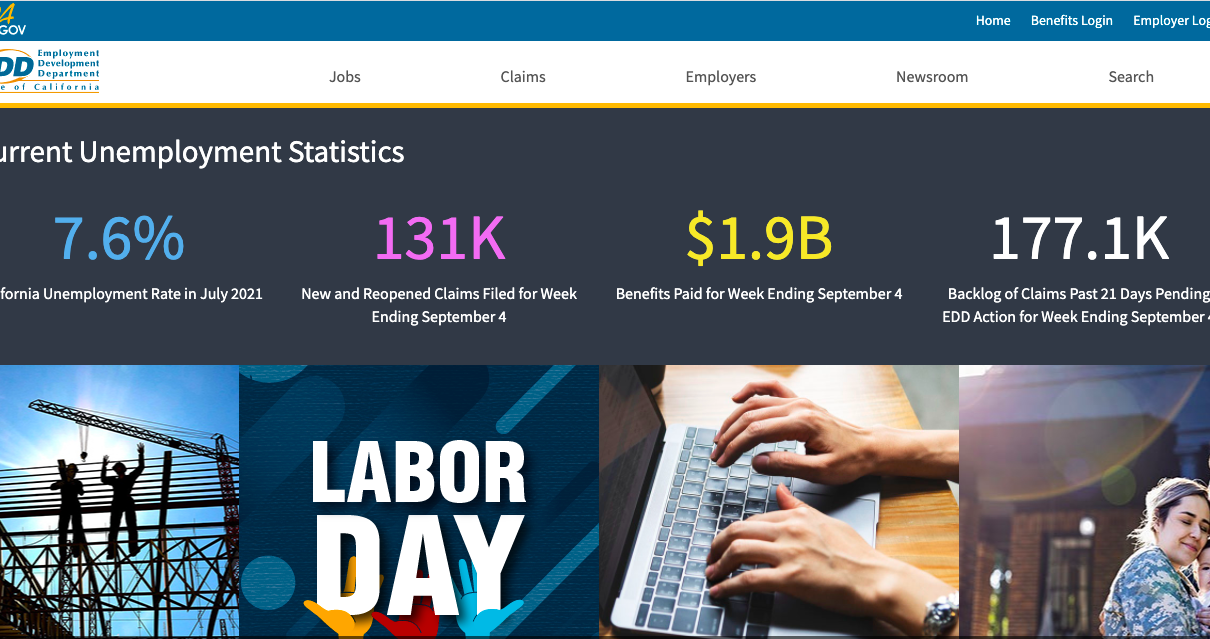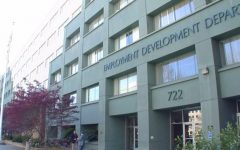
California EDD website for unemployment claims. (Photo: edd.ca.gov)
BREAKING: California EDD ‘Structurally Insolvent’
‘The latest EDD catastrophe will force ‘the business community to pay for the incompetence of the government’
By Thomas Buckley, July 8, 2023 8:26 am
The Unemployment Insurance (UI) trust fund the California Employment Development Department uses to pay benefits is now “structurally insolvent” a new Legislative Analyst’s Office report states.
The report – a reaction to the “May Fund Forecast” released by the EDD last week states quite bluntly that the “temporary” – now about 15 years and not the six or seven years the EDD originally projected – federal surcharge will be used to cover on-going bills before actually paying the $18 billion-dollar federal debt the agency incurred due to gross incompetence during the pandemic.
That additional tax works out to be about $1,500 per California employee over the next 15 years (it starts at $21 per employee and rises until it hits $420 per year until the debt is paid.)
The state is using that money now to pay benefits (which are guaranteed by the feds so no matter what financial shape the EDD is claimants will still get paid.)
But the report notes that even without the pandemic debt, the state would still have to borrow money over the next few years, an utterly novel situation in a putatively “good” economy (though the pandemic debt is the cause of the insolvency and the size of the tax hike.)
The structural insolvency will last for at least two to five years.
“Historically, benefit payments have only exceeded contributions during major economic downturns – most recently, during the pandemic and Great Recession,” the report states. “For the first time, the fund is expected to be out of balance during a period of job growth.”
While the EDD expects to take in about the same amount of regular UI tax money in the next couple of years – $5.3 billion per – it will spend about $2.6 billion more than that, driving the current $18 billion (including interest, which will for some time add an extra $300 million a year or so to the debt) to $20.6 billion dollars.
Neither the EDD nor the Governor’s Office replied to request for comment. As per Globe practice, those questions are at the bottom of this article.
Besides clearly showing the utter mismanagement of the agency over the past umpteen years (Sacramento insiders call the EDD “the place where state careers go to die”), the latest crushing blow could finally prompt reform of the agency. That reform, however, could cause even more issues as it could lead to additional UI taxes in one form or the other.
Currently, the state has one of the highest unemployment tax rates in the country, but, oddly, the lowest “taxable wage ceiling” rate possible. Taxes are paid on only the first $7,000 of income per employee, meaning the part-time intern costs the same to insure as the CEO even though the amount in benefits they would receive if laid off are wildly different. The state has not changed this base rate in about 50 years, while wages and, therefore, the benefits offered have risen dramatically since.
Additionally, the rates employers pay vary depending upon whether or not they have had significant layoffs and other similar issues that strain the unemployment system in the past; “stable” employers can expect to pay only about one-third the rate of “problematic” ones, but the debt obligation to the feds is essentially paid equally by everyone.
Changing that system – especially the wage ceiling – has been a topic of discussion for some time as most other states do have higher wage ceilings but lower actual per-employee tax rates (not necessarily actual taxes, but tax rates.)
“As noted by LAO, California’s UI financing scheme needs to be reformed,” said Audrey Guo, Assistant Professor of Economics at Santa Clara University. “Even if the current debt were repaid from the federal relief funds, solvency problems will continue to crop up in future recessions, unless actual UI tax increases are implemented which policymakers have been hesitant to do because it’s seen as a tax increase on employers.”
Guo and others who have backed such reform have in the past usually called it “revenue neutral,” i.e. the total EDD haul stays the same – low wage taxes go down and higher wage jobs are taxed more to cover the cost of the higher concomitant benefits.
Given the political make-up of state government at this time, the chances of any such change actually being revenue neutral is, not to put to fine a point on it, both physically and literally impossible in this particular political space-time dimension.
Rob Moutrie, a policy expert with the California Chamber of Commerce, said his group is “disappointed to see that California businesses will be paying an extra tax for even longer than expected.”
Moutrie did note that the UI fund “was never intended to be used by the state as a society-wide social safety net” and that, unlike California, other states realized that unique situation and made sure to pay any pandemic debt they incurred down immediately.
The state is now one of two (and the Virgin Islands) that has any remaining debt, accounting for 73 percent of that debt nationwide (New York is the rest.)
California lost about $40 billion to unemployment fraud during the pandemic, the vast majority of which could have been prevented early on with a $5 to 10 million expense to institute some kind – any kind, as the state literally had none – of fraud prevention identity security system. Instead, then-labor department chief Julie Su – who was aware of the problem – waited months to install such a system.
What – if any reform – will occur is unknown, but whatever it is may not be happening soon. Gavin Newsom is kinda sorta maybe-ish running for president – well, more positioning himself to be tapped as the savior when the Democrats finally admit that Biden is mentally incapable of continuing for health reasons and Vice President Harris is, just, well, mentally incapable in general.
Being seen to raise taxes right now could harm Newsom with a national audience (won’t matter except to the people who actually pay taxes in California and politically that’s not a big enough number.) Having the EDD raise its disfigured head in any way over the next 18 months is something Newsom is looking to avoid, so it can be expected that any major change will (maybe?) take place after the 2024 election.
“It’s possible that legislators view the federal surcharge as a way to avoid action and keep kicking the can down the road,” Guo said. “At this point reform (i.e. mandates) at the federal level may actually be the most effective way of shoring up the state’s UI program.”
Tom Manzo, founder of the California Business and Industrial Alliance, said the latest EDD catastrophe will force “the business community to pay for the incompetence of the government, as it has done again and again and again.”
He also believes any stab at reform will wait until after Newsom has left office.
One way or the other.
As stated above, here are the questions the EDD did not respond to:
- Was the decision not to pay off the debt intentional in the sense the EDD knew the surcharge would eventually cover it?
- Can the public depend on the fund?
- The LAO report on the May fund forecast calls the UI trust structurally insolvent ? Is this correct?
And the Governor’s Office:
- The LAO report calls the Edd structurally insolvent – General comment?
- Do you have plans to fix?
- Paying the fed debt would have avoided this – why wasn’t that done ?
- Was that intentional as a way to increase EDD funding without having to pass a new tax?
- Benefit Fraud Problems and Solutions - November 7, 2024
- A Little Exit Poll - November 5, 2024
- Tomorrow’s Headlines Today! - November 5, 2024




Meanwhile Newsom is trying to deflect from the EDD insolvency and other messes by calling on the U.S. Dept. of Justice to conduct an investigation into the state of Florida for flying migrants to the California even though he and Democrats had designated California a sanctuary state for illegals.
Prez-Campaign-Denier Newsom has reportedly been campaigning (for Prez) in Idaho and Oregon and likely other fertile blue spots elsewhere this week, then probably needed another luxury vacation outing to “recover.” As we know he never gave a rat’s rear end about the EDD implosion in the first place or preventing a disaster from turning into a four-alarm-state-on-fire catastrophe once the $40 BILLION fraud had became more-than-apparent. You know, the one where CA employees who through no fault of their own because of Covid shutdowns couldn’t even get anyone to pick up the phone at the EDD —- for weeks and months — but undeserving criminals and prisoners across the country —- and even worldwide? —- received huge checks for their fraudulent efforts. Which fraud, as Thomas Buckley recounts, according to the LAO report, was only PART of the problem.
But what did we expect from a combination of nearly suicidal incompetence, neglect, and corruption on the part of our state “leadership?” We’ve been trained under Newsom as Gov. and his utterly useless and like-minded state office holder clown cronies to expect no plan, no accountability, no urgency to repair or reform, no action of any kind, ever, in response to ANYTHING. Go spend some time reading Globe archives to refresh yourself about just how many hundreds of times this has occurred, thanks to Gavin Newsom & the Gang. These people care about NOTHING except their own ill-gotten power. They certainly do not care about fulfilling their responsibilities to Californians —- and never have.
Meanwhile, unbelievably, the surreal confirmation hearings for former EDD head Julie Su to be our next U.S. Labor Secretary will go on…
Stupid Newsom! A nut from the Pelosi family tree.
That is before reparations. Lmao.
Monies stolen and squandered exclusive by democrats, they all need to be killed. Then the rinos. Then we can fix the country.